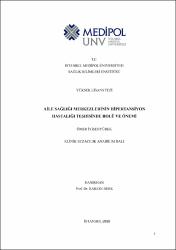| dc.contributor.advisor | Berk, Barkın | |
| dc.contributor.author | İyişenyürek, Ömer | |
| dc.date.accessioned | 2021-07-01T10:20:44Z | |
| dc.date.available | 2021-07-01T10:20:44Z | |
| dc.date.issued | 2018 | en_US |
| dc.date.submitted | 2018-11-06 | |
| dc.identifier.citation | İyişenyürek, Ö. (2018). Aile sağlığı merkezlerinin hipertansiyon hastalığı teşhisinde rolü ve önemi. (Yayınlanmamış yüksek lisans tezi). İstanbul Medipol Üniversitesi Sağlık Bilimleri Enstitüsü, İstanbul. | en_US |
| dc.identifier.uri | https://hdl.handle.net/20.500.12511/7420 | |
| dc.description.abstract | Dünya Sağlık Örgütü hipertansiyonu önlenebilir ölüm nedenlerinin başında yer alan prevelansı en yüksek sağlık sorunu olarak tanımlamaktadır. Koruyucu hekimlik ve erken tanı sağlık hizmetlerinin koordinasyonu, entegrasyonu ve çoğu tıbbi problemi yönetme becerisi, aile hekimlerinin temel özelliklerindendir. Bu çalışmada aile sağlığı merkezlerinin hipertansiyon hastalığı teşhisindeki rolünün güncel literatür ve klinik eczacılık ışığında incelenmesi amaçlanmıştır. Deneklerin demografik bilgilerini ve hipertansiyon ile ilgili olarak hastaların başvurduğu hekimlerin hipertansiyon tanı ve tedavi yaklaşımlarına yönelik sorulardan oluşan sorulardan oluşan anket veri toplama aracı olarak kullanılmıştır. Verilerin analizi SPSS 23.0 istatistik paket programında yapıldı. Çalışmamızdaki olguların yaş ortalamaları kadınlarda 58,09±1,92 ve erkeklerde 56,6±1,82 olarak bulunmuş olup cinsiyetin aile öyküsü sorgulanması ve uzman hekime yönlendirilme ile ilişkili olduğu saptanmıştır. Örneklemimiz eğitim durumlarına göre değerlendirildiğinde büyük çoğunluğunun ilkokul (%68) düzeyinde olduğu görülmüştür. Hipertansiyonlu olguların %40,8'inde diyabet hastalığı saptandı. Örneklemin geri kalan %52,6'sının multimorbid olmadığı görülmüştür. Olguların 80,3'ünde tansiyon ölçümünün yapılmadığı saptanmıştır. Örneklemin hipertansiyon tanısı %9 oranında aile hekimleri tarafından konurken; %81 dahiliye hekimleri tarafından konulmuştur. Örneklemin %17'sinin hipertansiyon tanısının konma şekli rutin kontroldür. Örneklemin "Aile hekimi tarafından hipertansiyon aile öyküsü soruldu mu?" ve "Aile hekimi sizi uzmana yönlendirdi mi?" soruları birbiriyle kuvvetli derecede anlamlı ilişkili olup sonuçlar iki parametre için eşit şekilde örneklemin %88'inde"Hayır" olarak saptanmıştır. Tansiyon ölçümü yapan hekimlerin diğer tutum yaklaşımlarda da kanıta dayalı tıp ile uyumlu olduğu görülmüştür. Çalışmamız, aile sağlığı merkezlerinin hipertansiyona yaklaşımlarının kanıta dayalı tıp ile uyumsuz olduğunu birçok açıdan göstermektedir. Klinik eczacıların hastalara eczanelerinde danışmanlık yaparak bu problemin azalabileceği düşünülmektedir. | en_US |
| dc.description.abstract | World Health Organization defines the hypertension as a health problem that is the preventable cause of death with the highest prevalence. Preventative medicine, coordination and integration of early diagnosis and manipulation of most of the medical problems are the basic features of family physicians. In this study it was aimed to search the role of family health centers in the diagnosis of hypertension disease, with the help of current literature and clinical pharmacy. The demographical data of subjects and the questions asked by the physicians throughout the hypertension diagnosis and treatment are the data of this study. The data analysis with the SPSS 23.0 statistical program. The mean age was 58,.9±1.92 in female subjects and 56.6±1.82 in male subjects and it was found that the gender of patients was related with questioning family history and referral to specialized physician. The education level of the sample is majorly primary school (68%). It was found that the 40.8% of hypertension subjects have diabetes mellitus. The rest of the sample, 52.6%, is not multimorbid. It was found that the blood pressure measurement was not performed in 80.3% of the cases. The diagnosis of hypertension was made by family physicians with 9% rate, and 81% of the cases have been diagnosed by internal medicine physicians. The 17% of the cases have been diagnosed during the routine visit. The questions of "was it asked the family history by the family physician?" and "did the family physician refer you to the specialized physician?" were correlated strongly with each other and the results were 88% "No" for both questions. The overall patient management of the physicians, who checked fort the blood pressure, were suitable to the evidence-based medicine. This study showed that the management of hypertension in family health centers is irrelevant at many aspects with evidence-based medicine. It is thought that this problem could be solved by giving consultation to the patients in pharmacies by clinical pharmacists. | en_US |
| dc.language.iso | tur | en_US |
| dc.publisher | İstanbul Medipol Üniversitesi Sağlık Bilimleri Enstitüsü | en_US |
| dc.rights | info:eu-repo/semantics/openAccess | en_US |
| dc.subject | Aile Hekimliği | en_US |
| dc.subject | Aile Sağlığı Merkezi | en_US |
| dc.subject | Hasta Yönlendirme | en_US |
| dc.subject | Hipertansiyon | en_US |
| dc.subject | Multimorbidite | en_US |
| dc.subject | Family Health Centers | en_US |
| dc.subject | Family Medicine | en_US |
| dc.subject | Hypertension | en_US |
| dc.subject | Multimorbidity | en_US |
| dc.subject | Patient Referral | en_US |
| dc.title | Aile sağlığı merkezlerinin hipertansiyon hastalığı teşhisinde rolü ve önemi | en_US |
| dc.title.alternative | The role of family health centers in the diagnosis of hypertension | en_US |
| dc.type | masterThesis | en_US |
| dc.department | İstanbul Medipol Üniversitesi, Sağlık Bilimleri Enstitüsü, Klinik Eczacılık Ana Bilim Dalı | en_US |
| dc.relation.publicationcategory | Tez | en_US |


















